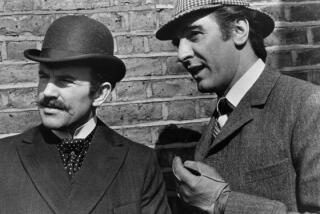Uncertain Future for the Works of Mark Twain : Literature: For 30 years, a UC project produced authoritative editions of the author’s stories and letters. Now, its two major sponsors may cut back support.
- Share via
BERKELEY — UC Berkeley’s Mark Twain Project is as hard to find as some of the writer’s original manuscripts.
“No one seems to know where we are, “ says project associate editor Richard Bucci from the Bancroft Library fourth floor, where a warren of tiny offices houses the world’s largest collection of manuscripts, letters and notebooks by Samuel L. Clemens.
“Many people who know where we are might wish we were somewhere else,” says Robert H. Hirst, general editor of the project.
Hirst’s remark is a dry reference to the fact that the 30-year-old project, which produces authoritative editions of Mark Twain’s work, may no longer be wanted by its principal sponsors.
The National Endowment for the Humanities, which funds most of the project, recently cut its support substantially, and the university, which provides $100,000 a year, is considering moderate to severe cutbacks.
The Mark Twain Project began in 1962, after Mark Twain’s personal papers were bequeathed to the university by his daughter, Clara Samossoud, who died that year in San Diego.
The project’s eight editors--some of whom have been there for 25 years--have produced 29 volumes of scholarly and popular books, all published by the University of California Press. A third edition of letters, from the year 1869, will be released soon. Three more books are on line for next year: an edition of “Roughing It,” a fourth volume of letters, from 1870-71, and a third volume of Mark Twain’s literary journalism, “Early Tales & Sketches.”
But the National Endowment for the Humanities, which has provided more than $4 million in support, has grown impatient with the pace of the editors, who are not scheduled to complete their goal of 73 volumes until 2015.
Berkeley, which pays Hirst’s $64,300 salary and provides an administrative assistant and office space, is considering cutting or eliminating its support after the fiscal year ends in June, with a decision expected Thursday.
“The endowment is saying, ‘Speed up,’ and the university is saying, ‘Cut down,’ ” Hirst says.
The NEH, which has given the project high marks in the past, believes things are dragging on.
“It’s really frustrating to wait year after year--decades is what you’re talking about,” says Jerry L. Martin, NEH assistant chairman of programs and policy in Washington. “Instead of getting the papers out, they are spending too much time with their own commentary. It can be a temptation to editors who love their author to track down every minute detail surrounding a given document and put that in a footnote or commentary.”
“When you say you’re going to be done in the year 2015, they (NEH representatives) look around and say, ‘Everyone in this room will be dead.’ It makes it intimidating,” says Hirst.
The NEH turned down the project’s most recent funding request for $635,580 for two years, countering with an offer of $240,000 for one year, $150,000 of that contingent on matching private funds.
As a compromise, Hirst proposed reducing the number of planned volumes, which cover the period up to the mid-1890s, 15 years before Twain’s death. The new plan would have a completion date in 2009 and a 17-year cost of about $4 million in federal funds.
On May 20, NEH officials are scheduled to visit the campus to discuss the project’s future. But that may be decided before then by the university, which could refuse to accept the NEH grant as well as cut back or eliminate its own funding for the project.
University Vice Chancellor John Heilbron, who will decide on the UC Berkeley funding and whether the university will accept the NEH grant, will not comment publicly.
“If we can accept the grant, we will have a year to evaluate what our prospects will be to continue this in the future,” says Bancroft Library interim director Peter Hanff, who administers the project. “I don’t think there’s any inclination to end it. Of course, that’s always a possibility.”
“It’s not as if we are alone,” Hirst says. “It’s a university-wide phenomenon. I’m being given plans to reduce the annual expenses by a very significant factor. I’m told, compared to what’s happening to other programs on campus, what’s happening to us is generous.
“If the program is seriously cut back, the whole concept of what we are doing will be dissolved,” Hirst says. “What people will lose is the untold story in Mark Twain’s letters. Very few of them have been published, and those that have been published have been done in maddening ways, snatches and extracts, topical selections. Scholars cannot get the daily story of Mark Twain, which he himself wrote.”
The Mark Twain Project is a trove for Twain enthusiasts. Rows of cabinets are filled with original correspondence with politicians and writers from Grover Cleveland to Walt Whitman. There are 50 notebooks, including the one Twain used to write on how to pilot steamships along the Mississippi.
A large part of the project is the restoration of Twain’s original work. Publishers frequently changed Twain’s work, prompting him to write a friend in 1889, “I have just telegraphed the order to have the proofreaders shot.”
“The Adventures of Huckleberry Finn,” was substantially edited, and it has taken the Berkeley Twain scholars years of reviewing original handwritten manuscripts to publish an edition as near as possible to what Twain intended. The recent discovery of an original version of the first half of “Huckleberry Finn” in a Hollywood attic means even the project’s recent revision may not be accurate.
The editors search the country for original documents, compare published work with handwritten manuscripts and provide historical annotations. Hirst says their research is crucial in helping Americans understand Twain’s intentions.
For example, Twain has been called a racist by some modern readers because of his depiction of Jim the black slave in “Huckleberry Finn.” But Hirst points to a Twain letter dated in 1885, the year the book was published in the United States, that reveals his offer to provide financial assistance to one of the first black students at Yale Law School.
News of the project’s possible demise has sent out shock waves. Twain scholar Lawrence Berkove, a professor at the University of Michigan, says the editions produced by the project are the only reliable versions of Twain’s writing. “The work they are doing no one else can do,” he says. “Projects like these can be disassembled in weeks, but they cannot be reassembled in decades.”
Thomas Tenney, editor of the Mark Twain Journal in Charleston, S.C., comments on the value of continuing to collect Twain’s letters. “He wrote an estimated 30,000 letters, of which 10,000 have been recovered. Some of his letters are among the best things he wrote.”
Severe cutbacks in the project would be a national mistake, says scholar Berkove: “Mark Twain is one of the world’s great authors. We are so close to him, less than a century. People of the future will look back and value every scrap of information about him. If we don’t do this now, we’ll lose it.”
More to Read
Sign up for our Book Club newsletter
Get the latest news, events and more from the Los Angeles Times Book Club, and help us get L.A. reading and talking.
You may occasionally receive promotional content from the Los Angeles Times.










